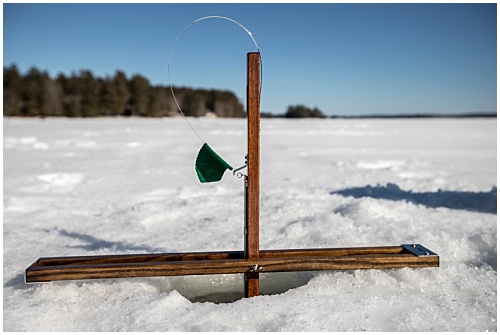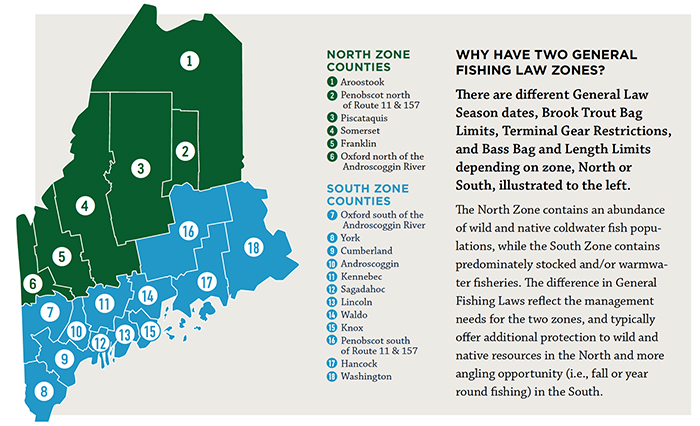ArrayDecember 29, 2021 at 2:13 pm
Ice fishing season is upon us! This favorite winter pastime is an exciting way to get outside with friends and family, create lasting memories, enjoy Maine’s prized natural resources, and reconnect with nature.
Fishing in Maine is regulated with water- and species-specific laws and regulations, all for good reason – to conserve our high-quality fisheries for generations to come, protect native resources, enhance fishing quality, maintain healthy ecosystems, control exotic species in certain waters, and for social reasons. Maine’s fisheries are unique and vary based on region, meaning our regulations need to vary, too.

We’ve compiled a list of frequently asked questions about Maine’s fishing laws to help you fish Maine’s waters responsibly. Before you go, be sure to view all of Maine’s fishing laws at mefishwildlife.com/fishinglaws
Who needs a fishing license?
A valid Maine fishing license is required for anyone 16 years of age or older, to fish in inland waters or transport fish taken from inland waters. Purchase a fishing license online or at a local agent. Click here to learn more about license requirements and fees.
During Free Fishing Weekend, February 17-18, 2024, any person (except those whose license has been suspended or revoked) may fish without a license. All other laws and regulations apply on these days.
How do I find the regulations for a water?
Step 1: Decide where you want to fish and then determine if the water is in the North Fishing Zone or the South Fishing Zone.

Step 2: Read the General Fishing Laws for that zone. General Fishing Laws apply to all inland waters. You must also check to see if the water has any special fishing laws (step 3)
Step 3: Check if the water you want to fish is listed in the alphabetical Special Fishing Laws.
- If the water is listed – Any exceptions to the General Fishing Laws will be designated by text or Special Season or Law Codes.
- If the water is not listed – Only General Fishing Laws apply. Unlisted Tribal Waters located in Passamaquoddy or Penobscot Indian Territory are an exception. See Tribal Water Laws.
Keep in Mind: Some waters (tributaries, outlets, connected waters) are not listed individually and may be listed with the main waterbody, or waters with an S-3 code (tributaries closed to taking smelts).
Some waters are collectively listed under one of the following area listings: Allagash Wilderness Waterway, Baxter State Park.
How do I find which waters have Special Fishing Laws?
There are three ways to search for special fishing laws:
- FLOAT (Fishing Laws Online Angling Tool) – This map-based display gives you a quick and easy way to see which of Maine’s thousands of inland waters have special fishing laws. By accessing it from your computer or smartphone, you can:
- Quickly locate a body of water
- Determine if it is regulated with General and/or Special Fishing Laws
- Download a PDF of the water body’s special fishing laws to print or view later
- Searchable Special Fishing Laws – Search by water name, general law zone, county, town, or by specific regulation.
- The lawbook – All of Maine’s fishing laws can be found at mefishwildlife.com/fishinglaws. All waters with special fishing laws are listed in the Special Fishing Laws section. A limited number of printed law books are available at local licensing agents.
Remember that you still must follow all other General Fishing Laws. Special Fishing Laws are simply exceptions to certain general laws, such as a different length limit for a certain water, meaning all other general fishing laws still apply.
What if the body of water is not listed in the law book?
If a body of water is not listed in the law book it is regulated under General Fishing Law meaning all General Laws apply and there are no “Special Fishing Laws” for that specific water.
Is ice fishing allowed in the North Zone?
Short answer – Yes, on certain waters. Under General Fishing Law in the North Zone, lakes, ponds, rivers, streams, and brooks are closed to all fishing from October 1 – March 31. This is a conservation approach to protect the abundant native resources found in that part of the state. However, there are hundreds of individual lakes and ponds open to ice fishing in the North Zone through Special Fishing Laws. Waters in the North Zone that are open to ice fishing are designated with an “A” or “B” special season code.
Do jig rods count toward the trap limit?
Yes. Unless otherwise provided by rule, the number of lines an angler may fish at any one time is limited to five lines while ice fishing. Jig rods count toward this limit.
Note: In waters with special code “S-8”, an angler is limited to two lines.
Can I use live fish as bait?
The answer to this question depends on where you are fishing. First, determine if you are fishing in the South Zone or the North Zone:
South Zone: If you are fishing in the South Zone, use of all legal forms of bait (including live baitfish/smelts), artificial lures, and artificial flies is PERMITTED under General Fishing Law.
Exception: Some waters in the South Zone have the “S-4” Special Law Code, meaning use or possession of live fish as bait is prohibited (the use of dead fish, salmon eggs, or worms is permitted.) To see if the water you intend to fish in the South Zone has this special law, look in the Special Fishing Laws to see if the water is listed and has the S-4 code. If the water is not listed under special fishing laws then it falls under General Law and live bait is allowed, if it is listed but does not have the S-4 code, then live bait is allowed.
North Zone: Under the North Zone General Fishing Law, the use or possession of live fish as bait is PROHIBITED, unless the individual water contains Special Fishing Laws to allow the use of live fish as bait. This conservation approach helps protect the abundant native resources in this part of the state. To determine if the North Zone water you wish to fish allows the use of live baitfish, find the water in the Special Fishing Laws section and look for the “S-11” Special Law Code indicating that the use or possession of live baitfish/live smelts is permitted. If your water is in the North Zone, and has that “S-11” Special Law Code, you can use live baitfish/live smelts.
North and South Zone: Waters with Special Law Code ALO do not permit live baitfish.
What is the required distance from a fishway, that you can fish?
The General Fishing Laws prohibit fishing within 150 feet from any part of a fishway.
Can I use a treble hook on my baited ice fishing line?
Yes. When fishing with bait, anglers are restricted to the use of a single baited hook on a line. By definition a hook is defined as a “single fish hook constructed with 1, 2, or 3 points. [Exception – Anglers hook and line fishing for smelt may fish an unlimited number of baited hooks on their line.]
Is a worm considered live bait?
Yes. Worms are not permitted in waters restricted to the use of Artificial Lures Only (in waters that are not ALO the use of worms is permitted).
Why are certain bodies of water closed to ice fishing?
There are several reasons why a water may be closed to ice fishing, but it ultimately comes down to the management goals and objectives for that particular water. Many waters are closed to ice fishing to protect wild populations of native fish species from being negatively impacted. Most of these are small to medium sized ponds where fish could be overharvested. Some waters closed to ice fishing are stocked waters but are managed to produce high size quality fish or to maximize the open water fishing experience. Statewide, waters are managed to offer a diversity of fishing opportunities. That way you, the angler, – can enjoy a variety of fishing experiences!
How do I know if a body of water has a line restriction?
If a water body has a line restriction it will be listed in the special fishing laws. Special Law Code “S-8” means the water body is restricted to two lines per person. The General Law line restriction is 5 lines per angler.
Can I use live fish as bait in the North Zone?
Starting in 2020, the General Fishing Law in the North Zone was changed to prohibit the use or possession of live fish as bait. This conservation approach reinforces the importance of the northern region’s native and wild brook trout populations, and stresses the potential damage to those fisheries when bait fish are introduced where they don’t belong. The General Law applies protection to the majority of the waters in the North Zone, and where the use of live baitfish/live smelts has been deemed acceptable, individual waters allow that use through the “S-11” special law code.
Are quick-strike rigs legal?
Yes.
Can I keep live bait fish in the water?
You may not store or hold live baitfish in any water where the use or possession of live fish as bait is prohibited during the entire fishing season. This includes waters restricted to artificial lures only, waters restricted to fly fishing only, and waters where there are other prohibitions on the use of live fish as bait. Temporarily storing baitfish in the water poses risks. If baitfish escape or are accidentally released it could have negative impacts on that water. The safest approach is to keep baitfish in a bait bucket on top of the ice (if live bait fish is permitted for that water body).
For waters that state “The holding of any live baitfish not taken in [LAKE NAME] is prohibited”, all live bait fish taken from other water bodies or bait shops must be stored outside the water in a bait bucket but can be used to fish, only live bait fish taken from that lake can be stored in the water.
Why do some waters have slot limits?
These regulations are bound by the upper and lower length limits, with the intent of directing harvest to specific parts of a fish population while protecting others. A slot limit may be used to “thin out” smaller fish to allow remaining fish to grow faster, and enable large fish to be caught and released or kept. The protected size slot protects fish and allows them to continue to grow and reach a larger size class. This regulation’s success depends on anglers — unless they harvest fish of a given size, the regulation is less effective at achieving the management goals.
Additional resources:
If you’re a beginner looking to try ice fishing and find out what gear you need, check out our Beginner’s Guide to Ice Fishing in Maine.